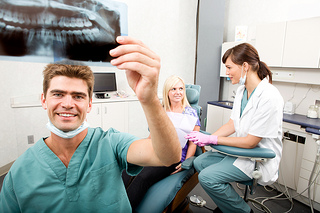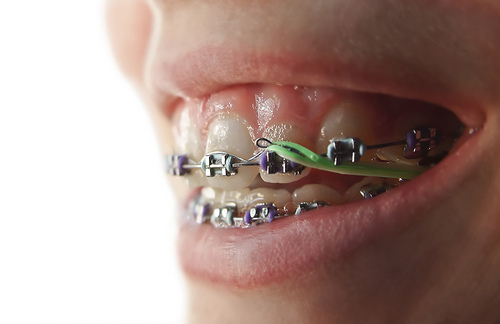Foods that are Safe for Braces
August 5th, 2014

Orthodontic braces are used to straighten the teeth, which not only creates a more pleasing appearance, but also helps prevent tooth decay and other oral health problems. Braces are only effective when they are properly cared for, however. Certain foods, for example, are better suited for individuals who have braces, as opposed to hard and sticky foods that can cause damage. So, what types of foods should you or your kids eat to protect dental appliances?
The best foods to eat with braces are those that are not high in sugar and do not require excessive chewing. For breakfast, try eggs, yogurt, bacon, wheat toast, or oatmeal. Lunch may steer toward a banana rather than an apple, a salad without nuts, and a glass of water. If you are looking for some after-school snacks for your kids, consider baked tortilla chips with salsa and guacamole, or try string cheese with fruit.
A healthy dinner can include most types of vegetables, so long as they are cooked to an appropriate softness. Pair that with a lean protein, such as fish or chicken, and follow up with dessert. Just be sure to brush afterward!
Post-Tightening Foods
As braces begin to adjust the alignment of the teeth, our team at Zoltan T. Berky, DDS will periodically tighten them to continue the alignment process. After tightening occurs, the teeth may be sore and sensitive to certain foods. During this time, it is best to eat soft foods. Examples include:
- Pudding
- Mashed potatoes
- Soup
- Ice cream
- Cottage cheese
- Peas
- Pancakes
- Pasta
Foods to Avoid
Anyone who wears braces – whether fixed or removable – should avoid excessive snacking and should aim to eat a healthy and balanced diet. It is also important to avoid foods that could cause damage to the braces, such as:
- Hard candies
- Gum
- Nuts
- Popcorn
- Certain raw vegetables (for example, carrots)
Considerations
Regardless of what types of foods you eat with braces, it is important to keep the crevices between the teeth and around the braces very clean. That means brushing and flossing after meals to prevent the build-up of plaque and decay. Not only can failing to do so damage the teeth, but it can also cause discoloration.
Have more questions about orthodontic treatment? The Zoltan T. Berky, DDS staff is always ready to answer all of your questions and help you get the most out of the treatment plan prescribed for you by Dr. Zoltan Berky!



